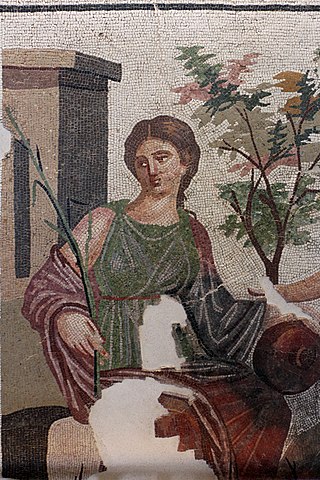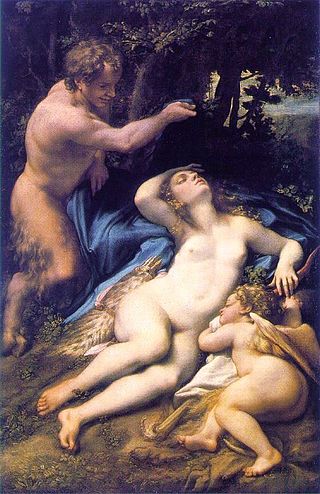Related Research Articles
Asopus is the name of four different rivers in Greece and one in Turkey. In Greek mythology, it was also the name of the gods of those rivers. Zeus carried off Aegina, Asopus' daughter, and Sisyphus, who had witnessed the act, told Asopus that he could reveal the identity of the person who had abducted Aegina, but in return Asopus would have to provide a perennial fountain of water at Corinth, Sisyphus' city. Accordingly, Asopus produced a fountain at Corinth, and pursued Zeus, but had to retreat for fear of Zeus' terrible thunderbolt.

Cyrene (Latin) or Kyrene, pronounced variously as sy-REE-nee or ky-REE-nee, was a figure in Greek mythology considered the etymon of the Greek colony of Cyrene in eastern Libya in North Africa. She was said to have been a Thessalian princess who became the queen of Cyrene, founded and named in her honor by Apollo. The story is entirely apocryphal, the city having been founded by settlers from Thera.

In Greek mythology, Harmonia is the goddess of harmony and concord. Her Roman counterpart is Concordia. Her Greek opposite is Eris, whose Roman counterpart is Discordia.
In Greek mythology, Cretheus may refer to the following characters:
In Greek mythology, Bias may refer to the following characters:

In Greek mythology, Sinope was one of the daughters of Asopus and thought to be an eponym of the city Sinope on the Black Sea.

Aegina was a figure of Greek mythology, the nymph of the island that bears her name, Aegina, lying in the Saronic Gulf between Attica and the Peloponnesos. The archaic Temple of Aphaea, the "Invisible Goddess", on the island was later subsumed by the cult of Athena. Aphaia (Ἀφαῖα) may be read as an attribute of Aegina that provides an epithet, or as a doublet of the goddess.
Actor is a very common name in Greek mythology. Here is a selection of characters that share this name :

In Greek mythology and religion, Corcyra or Korkyra is the naiad daughter of the river-god Asopos and the nymph Metope, herself the daughter of the river-god Ladon. She is the personification and tutelary goddess of the ancient Greek city and island of Korkyra, now better known as Corfu.
In Greek mythology, the name Polymela or Polymele may refer to the following figures:
In Greek mythology, the name Chthonia may refer to:

In Greek mythology, Antiope or Antiopa may refer to the following
In Greek mythology, Bias, was one of the three kings of Argos when the kingdom was divided into three domains. The other kings were his brother Melampus and Anaxagoras. From Bias, they say, a river in Messenia was called.
In Greek mythology, Erginus was a king of Minyan Orchomenus in Boeotia.

In Greek mythology, Orithyia or Oreithyia was an Athenian princess who was raped by Boreas, the north wind, and gave birth to the twin Boreads, Zetes and Calaïs.

In Greek mythology, Philyra or Phillyra was one of the 3,000 Oceanids, water-nymph daughters of the Titans Oceanus and Tethys.
In Greek mythology, Arne may refer to three different characters:
In Greek mythology, Theognete was the daughter of Laodicus. By Aeson, King of Iolcus, she was the mother of Jason and possibly Promachus. In some accounts, she was called Arne; Alcimede, daughter of Phylacus; Polymede, daughter of Autolycus; Amphinome; Rhoeo or Scarphe.
In Greek mythology, Rhoeo may refer to two distinct characters:
In Greek mythology, Scarphe was possibly the mother by Aeson, King of Iolcus, of Jason and possibly Promachus. In some accounts, she was called either (1) Arne; (2) Alcimede, daughter of Phylacus; (3) Polymede, daughter of Autolycus; (4) Amphinome; (5) Rhoeo or lastly, (6) Theognete, daughter of Laodicus.
References
- Apollodorus, The Library with an English Translation by Sir James George Frazer, F.B.A., F.R.S. in 2 Volumes, Cambridge, MA, Harvard University Press; London, William Heinemann Ltd. 1921. ISBN 0-674-99135-4. Online version at the Perseus Digital Library. Greek text available from the same website.
- Apollonius Rhodius, Argonautica translated by Robert Cooper Seaton (1853–1915), R. C. Loeb Classical Library Volume 001. London, William Heinemann Ltd, 1912. Online version at the Topos Text Project.
- Apollonius Rhodius, Argonautica. George W. Mooney. London. Longmans, Green. 1912. Greek text available at the Perseus Digital Library.
- Diodorus Siculus, The Library of History translated by Charles Henry Oldfather. Twelve volumes. Loeb Classical Library. Cambridge, Massachusetts: Harvard University Press; London: William Heinemann, Ltd. 1989. Vol. 3. Books 4.59–8. Online version at Bill Thayer's Web Site.
- Homer, The Odyssey with an English Translation by A.T. Murray, PH.D. in two volumes. Cambridge, MA., Harvard University Press; London, William Heinemann, Ltd. 1919. ISBN 978-0674995611. Online version at the Perseus Digital Library. Greek text available from the same website.
- Pindar, Odes translated by Diane Arnson Svarlien. 1990. Online version at the Perseus Digital Library.
- Pindar, The Odes of Pindar including the Principal Fragments with an Introduction and an English Translation by Sir John Sandys, Litt.D., FBA. Cambridge, MA., Harvard University Press; London, William Heinemann Ltd. 1937. Greek text available at the Perseus Digital Library.